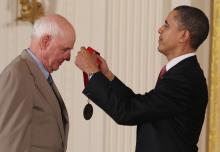Creation Care
For Talking Points Memo, Eric Lach reports on the 'progress' of the North Carolina bill that restricts state agencies’ ability to take global warming into account when making sea-level rise projections:
The language in the bill was toned down from the version that had been circulating — the original version of the bill stated starkly that rates of sea-level rise could use only historical data, extrapolated linearly, despite the fact that most scientists expect sea-levels to rise faster over the next century as a result of global warming — but the version of the bill approved Thursday still contains the following language:
[Rates of sea-level rise] shall be determined using statistically significant, peer-reviewed historical data generated using generally accepted scientific and statistical techniques. Historic rates of sea-level rise may be extrapolated to estimate future rates of rise but shall not include scenarios of accelerated rates of sea-level rise unless such rates are from statistically significant, peer-reviewed data and are consistent with historic trends.
Climate change experts and skeptics can hash it out all they want, but Victor Mughogho is living it.
His home country of Malawi is already feeling the effects of climate change in real and devastating ways. Five droughts in the past 20 years, coupled with changing weather patterns, have resulted in famine — and a generation of children growing up developmentally stunted because of malnourishment.

What is a climate orphan? Why is the term “fossil fuels” misleading? What do knives have to do with air pollution and valuing our children? How can addressing climate change be 100 percent compatible with Christian values? Why should we care?
These questions and many others were part of a national conference call on creation care and climate change recently hosted by Sojourners. A handful of our nation’s leading creation care voices came together to discuss how they answer tough questions and effectively communicate their faith and commitment to climate justice.
The speakers included:
Rev. Mitch Hescox, President & CEO of the Evangelical Environmental Network; contributor, Sacred Acts: How Churches are working together to Protect Earth’s Climate.
Rev. Sarah Scherschligt, Associate Pastor, Prince of Peace Lutheran Church, Gaithersburg, MD; author, http://thebarefootpastor.blogspot.com/; Founder and leader of the Creation Care Team for the Metropolitan Washington DC Synod of the Lutheran Church (ELCA).
Katharine Hayhoe, Director of Climate Science Center and Associate Professor at Texas Tech University; co-author, A Climate for Change: Global Warming Facts for Faith-Based Decisions.
Calvin B. DeWitt, Professor, Gaylord Nelson Institute for Environmental Studies, University of Wisconsin – Madison; author, Earthwise and Song of a Scientist: The Harmony of God-Soaked Creation
Listen to their presentations.
The city of Detroit has several thousand vacant houses, but Darryl Howard has at least as many worms. Howard is an intern with Earthworks Urban Farm, a program of the Capuchin Soup Kitchen on Detroit’s East Side. He dreams of running a small business that supplies worms to farms that dot the city landscape.
As Howard and his colleagues (invertebrate and vertebrate alike) know, worms work with materials that, from the outside, appear spent—and surprise us by producing rich, healthy soil. As he digs his hands into the dirt, still in the phase between food scraps and soil, a smile breaks across Howard’s face. “This is how I feed myself, my family, my community, and the world.”
Detroiters often use the phoenix rising from the ashes as a metaphor for the city’s resilience; in its 300-year history, Detroit has gone through several periods of bad times and has come back each time. Yet worms might be just as apt a symbol this time around.
Detroit could come very close to feeding itself. According to the Detroit Food Policy Council, farming less than half of the vacant publicly held land in the city could yield three-quarters of the vegetables and almost half of the fruit consumed by Detroit residents. In a city that bleeds money when buying food, that could be enormously stabilizing.
Furthermore, the economic impact is far from the only benefit. There is cultural and social power in growing food for your community.
Bio: Pastor of Providence Missionary Baptist Church in Atlanta, Gerogia, providenceatlanta.org
1. How did you get involved in environmental justice?
About six years ago, Laura Seydel, Ted Turner’s daughter, invited me to see a movie, The Great Warming. At the time, the environment was the last thing on my mind. I was more concerned about HIV, cholesterol, diabetes, unfair jail sentences, disparity in drug sentencing—these kinds of things. But I went to see the film.
The next thing I knew I was talking to African-American pastors about something that was not on our screen: Earth Day. If we understand that God created a perfect earth and that we’re destroying it, then we have an obligation to enlighten our people about this and find out what we can do. And I had to tell the people in the old environmental community that this is not a campaign—it has to be a movement, similar to the civil rights movement. People must be involved, knowledgeable, aware.
2. Why have you used the word “conversion” to talk about your awakening to environmental needs?
I could not make the connections initially between my community and polar bears, so I began to read about it. Once I began to understand, I took it from 2 Chronicles 7:14: “If my people will humble themselves and seek my face, turn from their wicked ways, then I will hear from heaven and heal their land.” I saw the land as bigger than just the ground; I saw the land as being all of us, as one. If God can create a climate where animals and plants and human beings work together, we have a responsibility to try to maintain that balance. That’s when the “conversion” really hit me.
From The Associated Press:
The world's air has reached what scientists call a troubling new milestone for carbon dioxide, the main global warming pollutant. Monitoring stations across the Arctic this spring are measuring more than 400 parts per million of the heat-trapping gas in the atmosphere.
Learn more here

Editor's Note: The following is testimony delivered by Alycia Ashburn, Creation Care Campaign Director for Sojourners, to the Environmental Protection Agency's New Source Pollution Standards for Carbon Pollution Hearing on May 24 in Washington, D.C.
My presence and testimony here today – in support of the EPA’s New Source Standards for Carbon Pollution – is as much a religious and personal act as it is a professional one.
While I am here wearing my “work hat” – as director of the creation care campaign at Sojourners (one of the nation’s largest network of Christians committed to social justice) - I wear my many other hats at the same time: U.S. citizen, Christian, congregation member, educator/trainer for Lutherans Restoring Creation, biologist, wife, daughter, runner, National Parks lover, and last but certainly not least, especially in this context: asthma sufferer.
In an opinion piece for The Huffington Post, Sen. Bernie Sanders (I-VT) writes:
At a time when we have more than $15 trillion national debt, American taxpayers are set to give away over $110 billion dollars to the oil, gas, and coal industries over the next decade. Clearly, we cannot afford it. When the five largest oil companies made over $1 trillion in profits in the last decade, with some paying no federal income taxes for part of that time, they certainly do not need it.
Read his full article here
WOW! More than 3,000 of you submitted comments to the Environmental Protection Agency regarding their proposed carbon regulation. Thank you for your heartfelt letters and remarks in support of this rule -- read some of them below! Why are people supporting the EPA carbon rule? Faith, health, science, family, you name it. Below you’ll find some samples from Sojourners members.

According to our friends at Good.is, Buckminster Fuller'sgeodesic dome is making a comeback with urban farmers.
A new dome-based prototype promises an affordable method of rooftop aquaculture for apartment and commercial buildings—as the website calls it, getting "fish from the sky." The Globe / Hedron bamboo domewould house an aquaponics system—a mini-ecosystem in which plants clean the water where fish swim and fish waste fertilizes the plants—capable of feeding 16 people year-round. The unique structure of the dome, designed by Conceptual Devices, would support the weight of the fish tank, enabling installation on flat roofs without adapting the structure of the building. The design firm is partnering with Zurich-based group UrbanFarmers, which developed the aqauponic technology, and they're currently fundraising on indiegogo to get the project off the ground.
The Atlantic reports on 'The Coming Global Water Crisis':
"In the next twenty years, global demand for fresh water will vastly outstrip reliable supply in many parts of the world. Thanks to population growth and agricultural intensification, humanity is drawing more heavily than ever on shared river basins and underground aquifers. Meanwhile, global warming is projected to exacerbate shortages in already water-stressed regions, even as it accelerates the rapid melting of glaciers and snow cover upon which a billion people depend for their ultimate source of water."
Read more about the crisis here

Sacred the land,
Sacred the water,
Sacred the sky,
Holy and true,
Sacred all life,
Sacred each other,
All reflect God who is good.
– Franciscan Brother Rufino Zaragoza, OFM
Last Friday night was the first time I uttered this refrain. As I sang, I felt a sense of gratitude to know the significance of these words and to feel the conviction of knowing that I have a responsibility in protecting that which is sacred.

Amy’s mom, Suzie, and stepfather, Russ, live on a 12-acre apple orchard nestled against the Rio Grande in northern New Mexico. Instead of describing it, I decided to show it.
Enjoy.
Of the many gifts that the 99 percent award to the 1 percent—the various tax breaks and tributes that have helped push inequality in America to record levels—none are quite as annoying as the subsidies awarded the fossil fuel industry.
Vermont Sen. Bernie Sanders introduced a bill this spring that would trim $20 billion a year from those payouts to coal and oil and gas companies. Barack Obama, modest almost to a fault, has identified $5 billion in handouts that he’d like taken away before this year’s budget is finalized. Whatever the number, the principle is crucial. Because if we can’t agree not to subsidize the fossil fuel industry, I’d submit we pretty much can’t agree about anything.
For environmentalists, few things could be more important. Worldwide, it’s estimated that global warming emissions could be cut in half if all governments stopped subsidizing fossil fuel—something that won’t happen unless the U.S. takes the lead.
But let’s say for the moment that you don’t care about climate change. Let’s say you agree with Republican Sen. James Inhofe of Oklahoma that global warming is impossible because it says in Genesis “that ‘as long as the earth remains there will be seed time and harvest, cold and heat, winter and summer, day and night.’ My point is, God’s still up there,” Inhofe said. “The arrogance of people to think that we, human beings, would be able to change what He is doing in the climate is to me outrageous.” (I can’t help myself: This is an exceedingly dumb theology. God allows war but prevents carbon emission from heating the atmosphere?) Even if you thought that way, you’d still want to keep the federal government from paying Exxon bonuses every year.

On Monday evening Wendell Berry delivered the 41st annual Jefferson Lecture in the Humanities, sponsored by the National Endowment of the Humanities, at the John F. Kennedy Center in Washington D.C. According to the NEH, this is “the most prestigious honor the federal government bestows for distinguished intellectual achievement in the humanities.”
In front of hundreds, Berry took his place among former recipients (Walker Percy, Toni Morrison, Arthur Miller, John Updike, and many others) to deliver a resonating essay on the beauty of place, imagination, and pleasure, titled “It All Turns on Affection.” The title hinges on E.M. Forster’s 1910 novel Howards End, which Berry said, takes some of its thrust as a “manifesto against materialism.”
Two years after the devastating Deepwater Horizon oil spill ravaged the Gulf of Mexico, federal officials today filed the first criminal charges in connection with the incident, The Huffington Post reports:
Kurt Mix, 50, a senior BP drilling engineer, allegedly destroyed hundreds of text messages sent to a supervisor that described high volumes of oil flowing from the ruptured well, located 5,000 feet underwater, according to a federal affidavit …
Mix is reportedly the first person who would actually be charged since the disaster occurred.
In its report of the arrest, The Associated Press noted that:
Kurt Mix, of Katy, Texas, was arrested on two counts of obstruction of justice.
The BP-leased rig Deepwater Horizon exploded the night of April 20, 2010, killing 11 workers and setting off the nation's worst offshore oil disaster. More than 200 million gallons of crude oil flowed out of the well off the Louisiana coast before it was capped.
At the time of the oil spill, Sojourners CEO Jim Wallis visited the Gulf Coast to view the devastation and spoke strongly, placing the culpability for the disaster in the hands of “human folly, human sinfulness and human greed.”
Jack Palmer is a communications assistant at Sojourners. Follow Jack on Twitter @JackPalmer88.

In honor of Earth Day, the White House Office of Faith-Based and Neighborhood Partnerships today hosted an Environmental Briefing for a number of environmental activists from all over the country.
Students, young professionals, members of the clergy and many other long-time activists were able to hear from members of the Obama administration and other key personnel from various departments and agencies, learning more about the progress that has been made to tackle climate change and environmental degradation, and also hear about the challenges ahead in ensuring that we are good stewards of the environment that has been entrusted to us.

A lawsuit that comes to a head May 11 could set a trajectory for how we legislate and mitigate against the devastating impacts of global climate change, Think Progress reports.
The suit, which has been dubbed a ‘David vs. Goliath battle,' sees a group of young adults taking on high-level government officials, states, energy companies and big businesses over their collective failure to adequately protect our planet for future generations.

The Nebraska state legislature on Wednesday approved a bill (LB1161) that will allow Nebraska to proceed with a $2 million study to find a route for TransCanada's proposed Keystone XL tar sands pipeline through the state. Gov. Dave Heineman is expected to sign the measure into law. But what does this mean?
It means a couple of things. First, it means that the global “people power” movement against the Keystone XL pipeline beat back the energy and oil industry in January when President Obama and the State Department denied TransCanada’s transnational permit. Our “united we stand” organizing strategy was effective. It forced the TransCanada to switch tactics. Now the oil industry is pushing a “divide and conquer” tactic. Its strategy is to break the pipeline up into state-sized parts and negotiate on each section. In Nebraska, new proposals to route the pipeline away from the environmentally sensitive Sandhills has removed a key political organizing tool from those of us who are working against the pipeline, especially in the Midwest.
Second, it means that Nebraska needs cash and will move forward to get it. Since the oil industry lobbyists have convinced the Obama administration to allow new routes to be proposed, Nebraska has leapt into the maneuvering space – in part to keep filling the state’s depleted coffers with funds from the TransCanada cash cow. The bill approved today will re-start the pipeline “review” process on the state level. And, the bill requires TransCanada to reimburse the state for the route study.